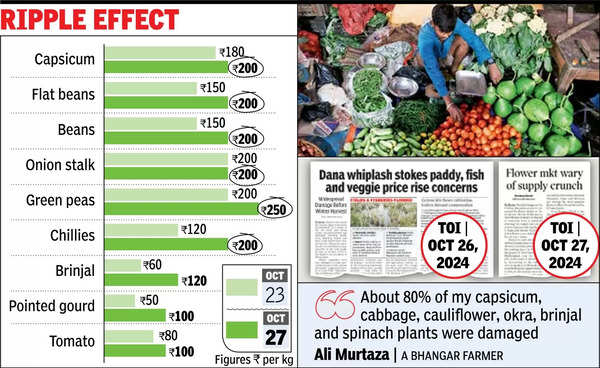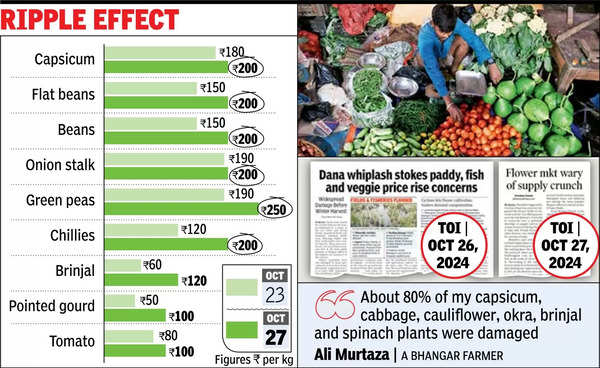Kolkata: Prices of beans, capsicum, onion stalks, chillies and green peas galloped past the Rs 200-mark on Sunday due to the impact of a recent cyclonic circulation, heavy rainfall, and a surge in high tides which created disruptions in the vegetable supply chain, driving up prices in markets across the city.
Tomato, pointed gourd and brinjal were also hovering around the Rs 100 per kg mark under its impact.


In some cases the price rise has been sharp. As on Oct 27, wholesale prices showed a substantial rise. Key items like brinjal jumped from Rs 60 to Rs 120 per kg, pointed gourd from Rs 50 to Rs 100 per kg, and chillies from Rs 120 to Rs 200 per kg. Prices of capsicum, flat beans and green peas from other states have also increased due to dip in local supply.
While some areas saw a quicker recovery due to fast-draining water and sunny weather, farmers in coastal districts like South 24 Parganas and East Midnapore faced significant crop loss.
These regions, which cultivate seasonal crops taking up to 90 days to yield, were especially affected as flooded fields caused rotting and decay of standing plants.
Other major agricultural hubs, including Hooghly, North 24 Parganas, Nadia and Burdwan, reported milder impacts and lesser crop damage.
Kamal De, president of the West Bengal Vendors’ Association, said although the immediate impact on vegetable prices was limited, supply issues in Howrah, Hooghly and East Midnapore could drive further price hikes if waterlogging persists.
Gopal Sonkar, a wholesale trader at Koley Market, said though produce from other states is still arriving, quantities are lower. “With local crops affected, vendors are trying to meet demand, but the risk of spoilage is high, so prices are likely to continue rising.” Authorities are working to assist farmers with drainage solutions and pest control measures.
Gouri Dasgupta, a teacher, said rising prices forced her to make adjustments to family meals.
The cyclone damaged vegetable farms across Bhangar, Baruipur, Deganga and Basirhat, creating a supply chain gap. With many seedbeds for winter crops damaged, prices of vegetables like tomato, cauliflower, cabbage, brinjal and chillies may continue to rise. Safikul Hasnat, assistant director of agriculture in Bhangar I, said fields where water has drained are less affected, while those that remain waterlogged face crop loss and increased disease risk.
We also published the following articles recently
Heavy rain and bacterial fungus have severely impacted marigold yields in Maharashtra, potentially causing price hikes during Diwali. Pune’s wholesale flower market is expecting reduced supply from affected districts. Farmers report significant crop damage, with some not cultivating due to last year’s losses. Marigolds hold cultural and medicinal significance, adding to demand concerns.
Prolonged monsoon withdrawal has severely damaged kharif crops in Canacona, with many ready-to-harvest paddy fields flattened or submerged. Farmers from Gulem, Cotigao, Shristhal, and Gaondongrim fear degraded grain quality and reduced yields. Mono Gaonkar highlighted difficulties in harvesting due to waterlogged fields. Farmers have urged government intervention for relief.
The Gujarat government announced a relief package of Rs 1,419.62 crore for farmers affected by heavy rains in August. Over 7 lakh farmers across 20 districts will receive assistance. Compensation varies by crop type, with non-irrigated crops getting up to Rs 11,000 per hectare and irrigated crops up to Rs 22,000 per hectare.





